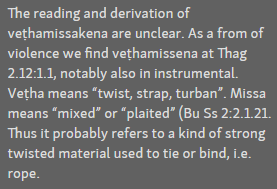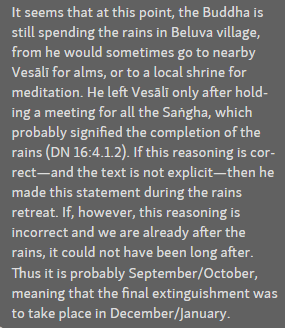
Footnote in DN 16: For last reference Kd 22, opening parenthesis missing.

Footnote in DN 16: For last reference Kd 22, opening parenthesis missing.
Comment to MN 1:51.1:
The “perfected one” is the arahant, literally “worthy one”, who is the Buddhist spiritual ideal. Their direct knowing is so powerful that it has cut through all fetters bindings them to transmigration.
Should be “all fetters binding them” (no “s” at the end of “binding”).
I’ve fixed this and will submit.
MN5:2.1: “Cattārome, āvuso, puggalā santo saṁvijjamānā lokasmiṁ.
“Mendicants, these four people are found in the world.
Should be “reverends” instead of “mendicants”.
Alobha, adosa, amoha are usually translated “contentment, love, and understanding”, but in DN 33 and DN 34 they are “non-greed, non-hate, and non-delusion”.

Footnote in DN 16. “As a from …” should read “As a form …” Also: Closing bracket is missing after “Bu Ss 2:2.1.21.”
At this page: https://suttacentral.net/pitaka/sutta/minor/dharmapadas it shows the following card:
It is a Tibetan translation of the Udanavarga, but the language-label in front reads “LZH” meaning “Chinese” where I would have expected “XCT” for “Tibetan”.

Footnote in DN 16. “From he” should probably read “From where he” or something to this effect.
Just curious…does the IT/web support team manage the bugs in some kind of workflow/ticket system like Jira? I realize there is minimal staff, almost all volunteer. But just wondering from an IT agile perspective. I can’t imagine trying to track bugs and fixes otherwise. Or if I can support in any way.
Much mettā ![]()
Jegucchi in the context of spiritual practice is usually translated “disgust of sin”, except for in MN 12 and Snp 4.13, where it is “disgust at sin”.
Sāyatatiyakampi udakorohanānuyogamanuyutto viharati
is sometimes translated “they pursue the practice of immersion in water three times a day, including the evening”, sometimes “they’re committed to the practice of immersion in water three times a day, including the evening”.
MN12:52.13: Seyyathāpi nāma āsītikapabbāni vā kāḷapabbāni vā; evamevassu me aṅgapaccaṅgāni bhavanti tāyevappāhāratāya.
Due to eating so little, my limbs became like the joints of an eighty-year-old or a corpse,
I am not sure how you come to this translation for āsītikapabbāni vā kāḷapabbāni vā. Both Bhikkhu Bodhi and Bhikkhu Mettiko (German) have “the jointed segments of vine stems or bamboo stems”, and the DPD says the same.
Tittakalābu (or tittakālābu) is “bitter gourd” in AN 1.314, AN 10.104, and MN 46 and “bitter-gourd” in MN 12, MN 36, MN 85, and MN 100.
comment at mn61:17.6:
speech ([mn61:11.6]()). → speech ([mn61:14.6]()).
an10.55:4.2 and an10.55:5.2 the Canuck in me is wondering “got to know” → “gotten to know”?
I think the only system is GitHub issues. The items in this thread are mostly with translations, so every so often Bhante Sujato will go through it in real time and make the corrections (I think). The actual bug thread I’m not sure. I think HongDa will just deal with the simple ones as they come.
If you would like to volunteer, best thing is to send Bhante Sujato a PM. I have noticed that some issues get completed without being closed, so he might like someone to go through and check on those things.
Comment to MN 12:42.5:
We have met tibba above in the sense of “sharp” feelings. It commonly means “scorching” which fits here; a hot forest is quite unpleasant, enhancing the pleasure of finding a cool lotus pond. At sn22.84:10.10 the same phrase is listed along with a range of other unpleasant geographies, and is said to be a term for ignorance.
It seems to me the forest grove is here not part of the suffering side of the scenery, but rather of the side of relief. Further down, after having drunk and bathed in the lotus pond, the person lies down in that forest grove to rest. As tibba can also mean simply “dense” (according to DPD), I think this would rather be the meaning here.
Thank you Ven. @Snowbird ! The github site looks quite efficient for tracking and closing. I’ll PM Bhante.
In Snp1.12
As the crested blue-necked peacock flying through the sky never approaches the speed of the swan
It should probably be translated as goose, not swan. Referring to Bhante Dhammika’s “Nature and the Environment in Early Buddhism” (page 198), hamsa is a term of geese or ducks. India didn’t have swan until British introduced them.
https://suttacentral.net/search?query=color{red}
\color{red}Something missing\color{black}Feeling aggregate had not ceased at this plane? (It) had ceased.
In the abbreviations list it has this:
From what I can tell the abbrevation for Dharmapadas is dharmapadas
The term netaṁ ṭhānaṁ vijjati is sometimes translated “it is quite impossible”, and sometimes “there’s no way it could”, or other variations.
Here looking at AN 1.41-50, where there are different forms in the same text; the same for the opposite too.
AN4.165:2.2: Idha, bhikkhave, ekacco akkhamo hoti sītassa uṇhassa jighacchāya pipāsāya, ḍaṁsamakasavātātapasarīsapasamphassānaṁ duruttānaṁ durāgatānaṁ vacanapathānaṁ uppannānaṁ sārīrikānaṁ vedanānaṁ dukkhānaṁ tibbānaṁ kharānaṁ kaṭukānaṁ asātānaṁ amanāpānaṁ pāṇaharānaṁ anadhivāsakajātiko hoti.
It’s when a mendicant cannot endure cold, heat, hunger, and thirst. They cannot endure the touch of flies, mosquitoes, wind, sun, and reptiles. They cannot endure rude and unwelcome criticism. And they cannot put up with physical pain—sharp, severe, acute, unpleasant, disagreeable, and life-threatening.
It’s not a mendicant, but “someone”. The same in segment 3.2.
I haven’t read the Venerable’s book but since some swan species are migratory, they don’t necessarily need to be introduced to the Indian subcontinent to be spotted there.